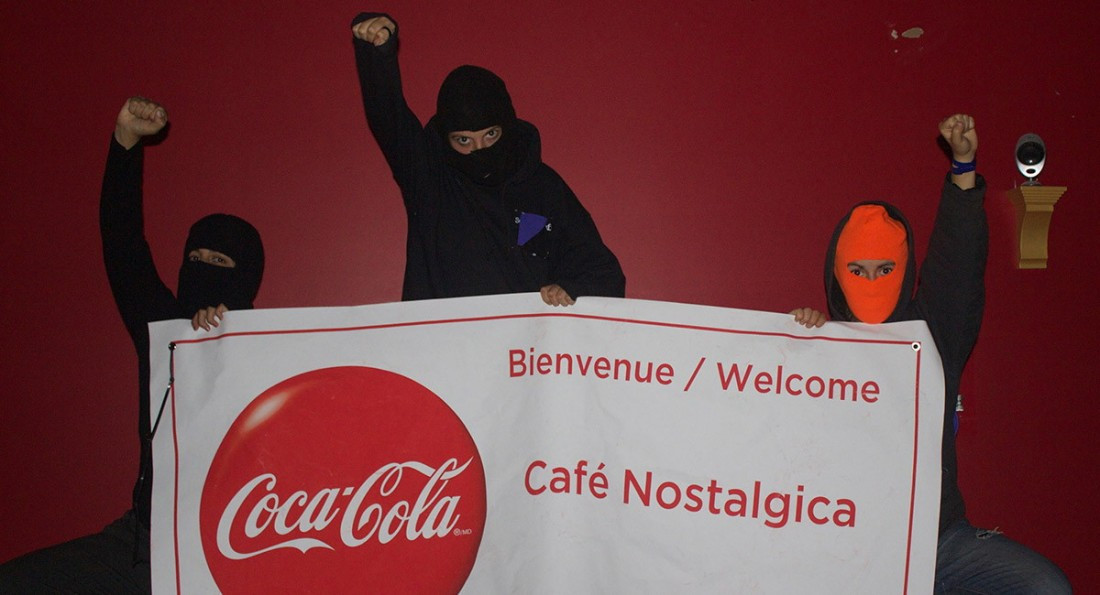Student Dispatch with Bilan Arte
The corporate campus playground
Throughout September, the University of Winnipeg faced student and community outrage against the University’s agreement with global oil giant, Enbridge, to fund the Eco-Kids Program. Eco-kids – a science-based mentorship program aimed at inner-city youth in grades 5 and 6 – provides a 10-week curriculum for children to meet and learn from professors and students at the University of Winnipeg on a range of topics from forensic sciences to natural resources to sustainability issues.
The funding deal with Enbridge included naming rights for the program at a cost of $25,000, in spite of Enbridge’s terrible environmental record; it has been responsible for over 800 oil spills in the last decade including one on the Kalamazoo River, the most devastating and costly inland oil spill in U.S. history.
While naming rights don’t necessarily include influence over the curriculum, Enbridge reviews all of the program’s curricula before deciding whether or not to fund it the following year. Following opposition to Enbridge’s role in the program – particularly strong from First Nations – the University’s administration chose to simply pull the plug on the Eco-Kids programs entirely.
The funding situation of the Eco-Kids Program is a perfect example of the state of our post-secondary education system today. Colleges and universities are forced to choose between either having programs like these and ensuring that funding comes from ethical partnerships, or not having them at all.
Inadequate public funding for institutions has led to an increased reliance on private funds – tuition fees and corporate investment. Where public funding used to cover 90 per cent of institutional costs in the 1970s, it now covers just over 50 percent. The result is that, in addition to increases in tuition fees, our campuses are becoming corporate playgrounds.
Increased corporate funding means that research is less likely to be in the public interest, as research priorities are directed by corporate dollars and research results are shaped by company agendas. We see this impact in ancillary services as well, with exclusivity contracts for low quality food, maintenance, and technology earning companies a hefty profit off the backs of students.
Most surprisingly, private, for-profit businesses like Navitas and the International College of Manitoba recruit international students and piggy back on the resources of public institutions.
In its most recent 2013 report, the anti-corruption agency Transparency International found a direct link between a decline in global levels of public funding for post-secondary education and a rise in instances of financial corruption and fraud within those institutions.
The corporatization of our campuses is a symptom of the erosion of public funding, but this can be reversed. When students and community members organize and work together to ensure better public funding – making public education a priority at the provincial and federal levels – governments are forced to listen.
At the University of Winnipeg, this work is already going on with groups like the University of Winnipeg Students Association, the Aboriginal Students Council, and F(un)CLASSE.
By blowing the whistle on Enbridge’s role in the Eco-Kids Program, students were able to shine light on just one part of the corporate influences that shape our education today. We need to keep this movement up to ensure that our public institutions are in fact working for the public good.
Bilan Arte is Chairperson for the Canadian Federation of Students–Manitoba. She previously served a term as President at the University of Manitoba Students’ Union and has been involved in student activism in Manitoba for over three years. She is currently completing a degree in Political Studies and Criminology at the University of Manitoba.
Published in Volume 68, Number 6 of The Uniter (October 10, 2013)







